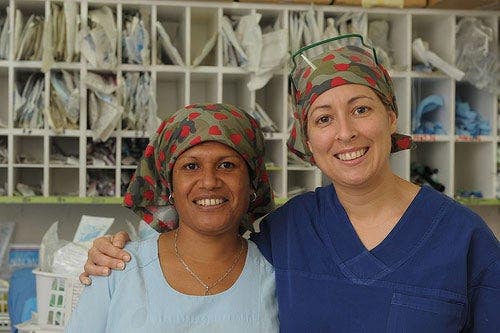5 Skills Necessary to Succeed as an NP

Conscientious Compassion
The Mayo Clinic lists compassion as one of the top skills and talents necessary for NPs. Indeed, compassion applies not only to patients but to families and other individuals connected to the patient.
In a qualitative study of patient care experiences in UK hospital settings published in Evidence-Based Nursing, researcher Katherine Curtis reports that compassion was seen as an essential component of effective nursing care and could be demonstrated through even small acts. “Patients saw compassion as based on acts that demonstrated human relationships ‘knowing me and giving me your time,’” she notes.
Ethical Decision Making
Ethics remains a critical part of an NP’s personal and professional lives. The NPWH (Nurse Practitioners in Women’s Health) organization notes many ethical dilemmas that NPs face today, ranging from insurance coverage dilemmas to end of life care. The Competency and Credentialing Institute (CCI), a nursing competency assessment and education institution for perioperative nursing, lists ethics high on its sample list of subjects for graduate nursing curriculum programs.
Indeed, NPs face a host of decisions each day, and a guiding ethical compass is key to helping NPs make decisions within the ethical standards and codes of the health care industry.
Critical Thinking and Reasoning
Coupled with ethical decision-making, NPs face a myriad number of decisions on a day-to-day basis. Critical thinking skills go hand in hand with ethical decision-making.
In a study published in Acta Informatica Medica (the Journal of Academy of Medical Sciences of Bosnia and Herzegovina), researchers Ionna V. Papathanasiou et al contend that specific behaviors, such as impartiality and integrity, can enhance the level of critical thinking. Further, “critical thinking is an essential process for the safe, efficient, and skillful nursing practice. Nursing education programs should adopt attitudes that promote critical thinking and mobilize the skills of critical reasoning.”
Effective Communication
Effective communication is not only valued, but expected of an NP. The body of professional literature in this area continues to grow, emphasizing the significance of this skill in practical application in health care settings.
Both oral and written forms of communication manifest themselves daily in an NP’s practice. The National Cancer Institute further delineates the nature of communication between clinicians and patients as consisting of the following three core components: “content of dialogue, the affective component (i.e., what happens emotionally … during the encounter), and nonverbal behaviors.”
Attention to Detail in the Patient-NP Relationship
In a March 2016 article featured in BWH Nurse (Brigham and Women’s Hospital), the role of attention to detail in fostering healing relationships is detailed in a story about heart transplant patient Richard Briggs and the NPs that formed a part of his care team. From pre-surgery to the time after his heart transplant surgery, the NPs spent time with Briggs and his wife, making sure the couple understood critical aspects of his care and condition.
“With heart transplant patients, because the transplant is such a crucial event, it makes for a very bonded relationship between nurse and patient and family. It’s also a very trusting relationship,” says NP Linda James.
“Knowing what’s important to each patient shapes the healing relationship between the patient and nurse,” the article notes.
For NPs, quality patient-centered care is inextricably linked to the previous five skills. Indeed, an NP has the power to impact lives by helping patients best manage their health needs.